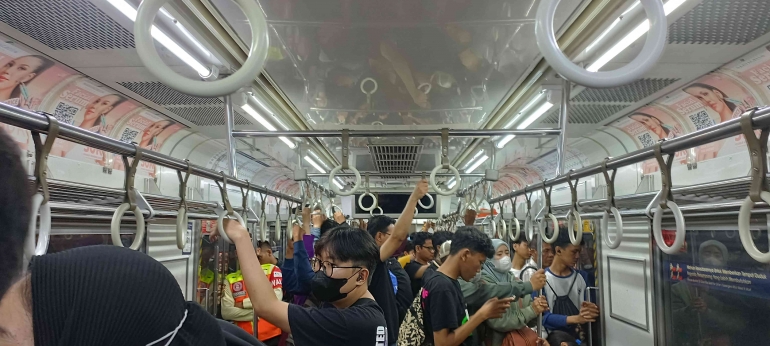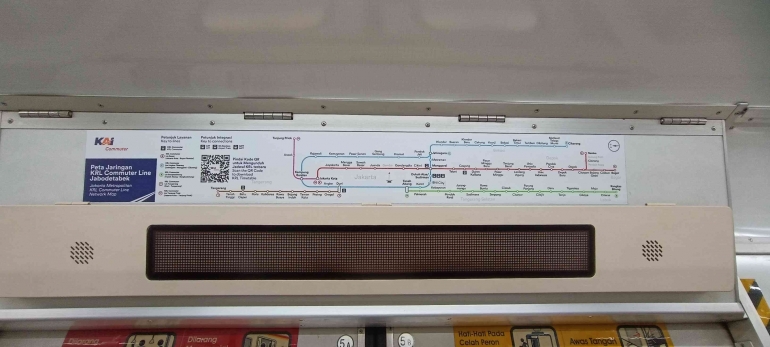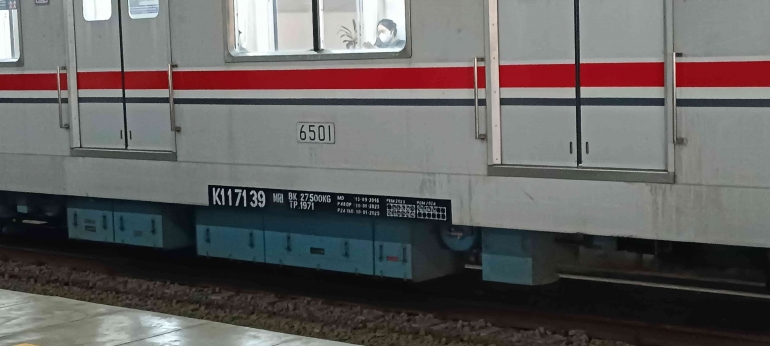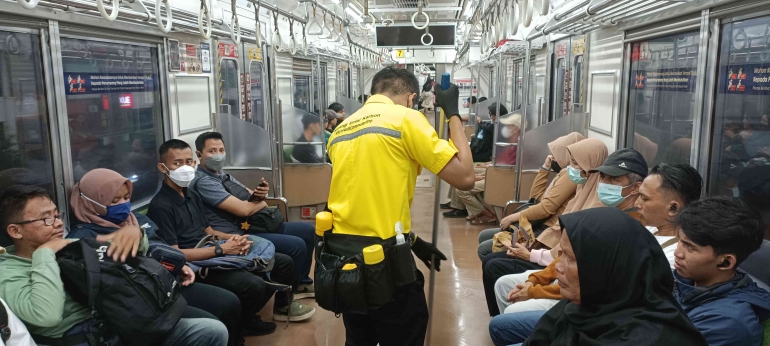Every day, around 1.2 million Jabodetabek residents rely on the Kereta Rel Listrik (KRL) as their main mode of transportation. The KRL, which has been operating since 1976, is the backbone of transportation in this dense urban area. It offers a quick and efficient solution compared to private vehicles that are often stuck in heavy traffic. However, despite its crucial role in people's mobility, the KRL faces serious problems that affect passenger comfort and safety.
Delays that Still Happen Often
Delay is one of the main problems faced by Electric Railway (KRL) users in the Jabodetabek area. Based on data obtained from dataindonesia.id, the average delay of KRL departure in 2022 is 2.5 minutes. Meanwhile, the average delay of KRL arrival is 3.7 minutes. This mainly occurs during the morning and evening rush hours, when passenger volume reaches its peak. These delays cause various negative impacts, both for passengers and for the operation of the KRL itself.
There are several causes of delayed trains that are not on schedule:
Signal Problems
The signal system used to regulate train movements is often disrupted. These systems work to ensure that trains move safely and in a well-coordinated manner. However, with outdated technology and lack of regular maintenance, disruptions to the signal system are a major cause of delays.
Reporting from Kompas.com on April 17, 2024, this was recognized by the Managing Director of PT KAI Commuter Jabodetabek, Tri Handoyo. He explained that the signaling equipment, especially on the Jakarta-Bogor route, had to be replaced, but it required large funding so that the replacement was carried out periodically.

Crowded Passengers
The surge of passengers during rush hour makes the process of getting on and off longer. Crowded stations and crowded passengers mean trains have to stop longer at each station. This causes overall delays, especially on congested routes.
"Overall, punctuality is appropriate. Comfort is also quite good, but during peak hours, conditions are very uncomfortable, and can be up to 10 minutes behind schedule," said Widi (20), a KRL user.

Infrastructure Limitations
Limited KRL tracks and the lack of double tracks on some routes are also a cause of delays. Lines that are used alternately by trains from the opposite direction cause queues and have to wait for other trains to pass. This condition exacerbates delays, especially on lines with a high frequency of travel.
Facts on the ground show that double-double tracks only exist on the line from Manggarai Station to Bekasi Station. This condition causes the line from Bekasi Station to Cikarang Station to only have two lines that must be used alternately with Long Distance Trains (KAJJ). As a result, there are often high delays due to these infrastructure limitations.

Old Fleet Condition
Most of the Electric Rail Train (KRL) fleet in Jabodetabek is more than 30 years old. Some units even reach an operational age of more than 40 years. The old age of the fleet affects the performance and reliability of the trains. This is because the majority of the KRL fleet is a used or donated fleet from JR (Japan Railways). Based on the investigation conducted, the majority of the KRL fleet was produced in the 1980s with the starting year of service in Indonesia in the 2014-2016 period.
Passengers often complain about the condition of the old fleet, with various technical problems that often occur during the trip. Damages such as jammed doors, malfunctioning air conditioners, and electrical problems have become a common sight. These problems not only disrupt comfort but also threaten passenger safety.
Technical malfunctions are the most common problems complained about by passengers. Here are some technical problems that often occur in the KRL fleet:
Stalled Doors
The frequent technical problem of jammed train doors has become a serious concern. Train doors that cannot open or close properly not only hamper the process of getting on and off passengers, but also pose a safety risk. As a result, trains are held up for long periods of time, passengers have to be transferred to other trains, and there is a buildup of passengers at the station.
Various factors can cause this incident, such as mechanical failure, motor failure, electrical system failure, lack of maintenance, or external factors. Lastly, a door jam incident occurred on January 30, 2024. According to the Kompas.com report, this incident occurred on Commuter Line No. 1772 route Tanah Abang-Rangkasbitung at 18.17 WIB at Pondok Ranji Station. The cause was a spring bed wire that was caught under the train, causing delays in other commuter line trips for 15-30 minutes.
Malfunctioning Air Conditioner
The problem of air conditioning not working properly is a common complaint on electric trains (KRL). In crowded trains, poor air-conditioning causes discomfort for passengers, especially during hot weather. This situation also increases health risks such as dehydration and heat exhaustion.
There are frequent instances where the air-conditioning is not working properly, resulting in many passengers opening the train windows due to overheating. This further worsens passenger comfort, especially during peak hours when the train is crowded.
Electrical Problems
Electrical problems in the KRL fleet are one of the main causes of operational disruption and passenger inconvenience. A reliable electrical system is essential to ensure the train's various components, from the drive motor to the passenger facilities, function properly.
Reporting from kompas.com, this incident occurred last time on February 12, 2023. The Commuter Rail Train (KRL) majoring in Manggarai-Bekasi had stopped operating due to an Electricity Overflow (LAA) disturbance. Making the Commuter KRL majoring in Manggarai-Bekasi stop operating at 06:03-08:37 on that day.
Supporting Facilities
Support facilities on the KRL are an important aspect that determines passenger comfort and satisfaction. These facilities include various elements that aim to provide a safe, comfortable, and efficient travel experience. However, some facilities still require repairs and upgrades.
At stations, easily accessible and well-functioning counters and tapping machines are essential to make it easier for passengers to purchase tickets. Sometimes, the tapping machines are broken or the queues at the counters are too long, disrupting passengers who are in a hurry.

A comfortable waiting area with ample seating is essential, especially during peak hours. A spacious, clean and air-conditioned waiting area will increase passenger comfort. Information screens that display real-time train arrival and departure schedules are helpful for passengers in planning their journey.
The cleanliness of facilities at the station, including toilets and trash bins, is also very important. Clean and well-maintained toilets at stations are essential for passenger comfort. The provision of sufficient trash bins and good waste management help keep the station clean. Security at the station and inside the train must also be considered. The presence of security guards at the station and in the train is essential to maintain order and provide a sense of security to passengers. The installation of surveillance cameras (CCTV) at the station and inside the train helps monitor the situation and prevent criminal acts.
Efforts and Solutions Implemented
PT Kereta Commuter Indonesia (KCI) has implemented various measures and solutions to address the issues faced by KRL services. Some of the key initiatives include routine maintenance programs and fleet rejuvenation. PT KCI regularly inspects and repairs the KRL fleet to ensure each train operates optimally. This includes mechanical repairs, electrical system updates, and maintenance of air conditioning and other supporting facilities.
In addition, PT KCI has invested in new technology to improve operational efficiency and passenger comfort. For example, a more advanced train management system has been introduced to monitor fleet conditions in real-time. This system enables early detection of technical problems, so that corrective action can be taken immediately before major disruptions occur.
Collaboration with external parties is also an important part of the improvement strategy. PT KCI works closely with the government on various infrastructure projects, including track improvements and station capacity enhancements. The government also provides support through subsidies and regulations that support the modernization of the KRL fleet.
The solution to the aging fleet, PT KCI is carrying out cooperation with a Chinese company, CRRC Sifang Co., Ltd. to import 3 units of KRL trains with the type KCI-SFC120-V for Rp. 783 billion. In addition, KAI Commuter has also signed a cooperation agreement to procure 16 series of new KRL facilities by PT INKA with a total investment of nearly IDR 3.83 trillion. And also, KAI Commuter has also signed a cooperation agreement to procure 19 series of KRL Retrofit by PT INKA with a total investment of more than Rp2.23 trillion.
Recommendations for the Future
For PT KCI
It is important for PT KCI to continue to carry out routine maintenance and periodic inspections of the fleet and facilities. This will prevent major breakdowns and ensure all components are functioning properly. Improve customer service through staff training and improved passenger complaint reporting systems. PT KCI can build a system that allows passengers to provide feedback easily and get a quick response.
For the Government
The government needs to increase investment in railway infrastructure to support more reliable operations. Track improvement projects, station expansions, and train capacity increases need to continue to be supported with adequate funding. The government can issue policies that support the modernization of the KRL fleet, including incentives for the use of environmentally friendly technology and regulations that ensure passenger safety and comfort.
Engaging Passengers
Passengers need to be encouraged to play an active role in maintaining cleanliness and public facilities in trains and stations. Educational campaigns on the importance of maintaining cleanliness and not damaging facilities can help create a more comfortable environment. Promote a more disciplined transportation culture and respect for public facilities. Passengers are expected to follow the rules, such as not smoking in restricted areas and giving seats to priority passengers.
With these measures, it is expected that KRL services can continue to evolve and provide a better travel experience for all passengers. Cooperation between PT KCI, the government, private parties, and passengers is essential to achieve this goal.
Follow Instagram @kompasianacom juga Tiktok @kompasiana biar nggak ketinggalan event seru komunitas dan tips dapat cuan dari Kompasiana. Baca juga cerita inspiratif langsung dari smartphone kamu dengan bergabung di WhatsApp Channel Kompasiana di SINI











